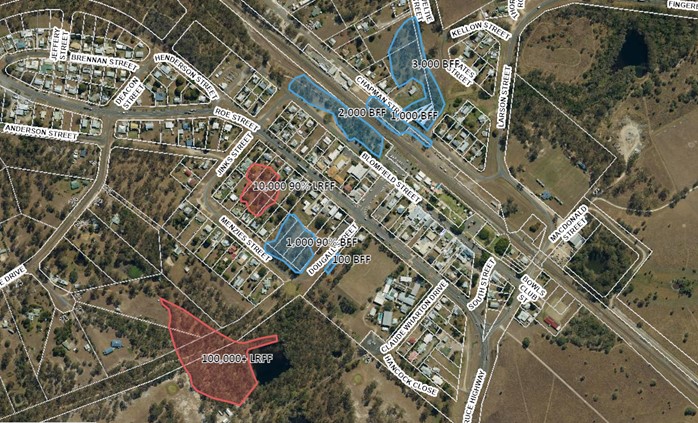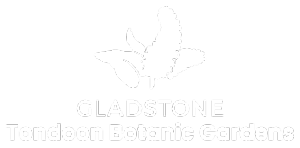Living Here
- Pets and Animals
- Residents
- Report
- Environment
- BackEnvironment
- Air Quality
- Biodiversity
- Biosecurity
- Blue-green algae blooms
- Bushfire Mitigation
- Coasts and Coastal Vegetation
- CoastSnap
- Conservation Programs and Initiatives
- Erosion and Sediment Control
- Feral Animals
- First Nations Fire and Land Officer
- Landfill Gas Abatement
- Mosquitoes
- Pests and Weeds
- Weed Spray Equipment Hire
- Wildlife
- Community Development
- Community Investment
- Services
- Emergencies
Flying-fox Roost Management - Miriam Vale
Frequently Asked Questions
Background
Flying-foxes have been recorded roosting in Miriam Vale since at least 2013. In the past, Council’s management activities have mainly focused on keeping flying-foxes away from the playground at Alf Larson Lions Park and supporting residents to self-manage impacts on their own properties. All Queensland local governments have an as-of-right authority (but not an obligation) to manage flying-foxes in accordance with state legislation, and Gladstone Regional Council does so under a Statement of Management Intent and Regional Flying-fox Management Plan.
Flying-foxes in Miriam Vale - Current influx
As of 15 January 2025, approximately 7000 black flying-foxes are occupying known roost areas across Chapman Street, Blomfield Street and Menzies Street parkland. We are also aware that a large number of little red flying-foxes are occupying backyard trees in several properties on Menzies Street and Roe Street.
A new congregation of little red flying-foxes has also established within bushland at the Miriam Vale Golf Course. This is estimated to contain at least 100,000 animals and is contributing to impacts of noise, odour, droppings and health concerns felt by residents on Menzies Street and across Miriam Vale.

Image shows current flying-fox roost areas in Miriam Vale
- Red shaded areas – Containing predominately little red flying-foxes
- Blue shaded areas – Containing predominantly black flying-foxes
Across Australia, flying-foxes are becoming increasingly present in urban environments. This is not due to an increase in their population, but rather a gradual adaptation to living alongside humans. It is thought their increasing presence is due to a combination of losing foraging and roosting habitat (exacerbated by climate change), and the attractive features of urban areas – such as fewer predators, and reliable food and water sources.
The preferred food source of the flying-fox species that visit Miriam Vale is the nectar and pollen of native flowering trees, with many Australian trees having flowers designed to attract flying-foxes for pollination (e.g. eucalypts, paperbarks).
An increased flying-fox presence can be expected when there is abundance of food in the local area, keeping in mind that flying-foxes can travel up to 50km per night to forage, and up to 270km when travelling between different roosts (depending on the species). Little red flying-foxes are particularly nomadic as they almost exclusively eat nectar and pollen. When a region’s trees are in mass bloom, little reds will come in large numbers for a short period of time, until food sources are exhausted (around 4 to 12 weeks).
Flying-foxes have strong memories of their roost sites and it can be expected that they will continue returning to roost in Miriam Vale even though roosts numbers may fluctuate or temporarily vacate at times of the year.
Council's role
Council will not be undertaking a dispersal of flying-foxes from the current, established roost locations. While several other local governments have attempted to disperse flying-fox roosts, the vast majority have failed to alleviate conflict with the community because flying-foxes were only shifted to other locations nearby. Council will continue providing information to residents to assist with managing the impact of roosts, including the options available to those whose properties are currently occupied by flying-foxes.
Council may consider rapid response dispersal where new congregations form in high-conflict locations on Council-controlled land and conditions are appropriate; including that it is newly established (<48hrs), there are a small number of flying-foxes and no dependent young are present. Council relies on the community promptly reporting the formation of flying-fox roosts in new areas.
Dispersal of flying-fox roosts are a high-risk, high-cost tool for mitigating the impact of flying-fox roosts. A 2021 peer-reviewed study assessed 48 attempts of roost dispersal across Australia, finding that in 88 per cent of cases, the roosts moved to an alternate location within 1km and conflict was only transferred to other parts of the community. Only 23 per cent of dispersal attempts were successful in resolving conflict, generally after extensive removal of vegetation or repeated action over months or years. Half of the successful cases required entire removal of vegetation, and all successful attempts cost more than $250,000. A full copy of the study can be accessed here.
All roost sites in Miriam Vale are surrounded by residential properties and other locations considered to be high conflict. Dispersing the flying-fox roost from this location poses a significant risk of shifting flying-foxes to other areas and potentially worsening impacts to the Miriam Vale community.
Dispersal of flying-fox roosts often fail to eliminate conflict with the community as flying-foxes either return to the original site or relocate to a location nearby.
This is because of three key factors:
- Flying-foxes are nomadic, continually moving between different roosts
- Flying-foxes do not travel as a group, and instead migrate as individuals, and
- Flying-foxes have an impressive memory for locations, and can live to over 20 years old.
The longer amount of time that a roost has existed, the greater number of flying-foxes that will have visited and memorised the location. Whilst a roost might be moved on a given day, the flying-foxes that have visited previously and are elsewhere at the time, will eventually return, naïve to what has happened while they were away.
Repeated disturbance is typically required over several months or years to have a greater chance of moving flying-foxes, however, removal of vegetation is the only way to guarantee flying-foxes cannot roost in a specific location. However, by removing vegetation, there is a risk that returning flying-foxes will move to the next closest vegetation.
As per the Regional Flying-fox Management Plan, Council maintains a contract for rapid response dispersal for Alf Larson Lions Park and has undertaken nudging activities to remove flying-foxes from the fig tree near the playground in 2017, 2018 and 2021. This action is supported as Alf Larson Lions Park is wholly Council-controlled land and management options that retain flying-foxes in this area were unable to adequately mitigate impacts to park users and the heritage listed fig trees. Nudging activities have always been undertaken when a small number of flying-foxes (<500) first returned to the tree and have successfully shifted them a short distance to an existing roost site, within 48 hours of arriving. All roosts in Miriam Vale naturally fluctuate in size and may vacate periodically as individual flying-foxes migrate across their range.
Council became aware of the roost in Menzies Street once it was reported by a resident on 17 January 2024. The resident advised that flying-foxes had been present for at least two weeks and by that stage, the roost already contained over 1000 animals. Rapid response dispersal is generally only effective during the initial stage of roost establishment (<48hrs) when only a small number of flying-foxes are present (and fewer have memorised the site), and when suitable vegetation is available close by for the flying-foxes to move into.
Furthermore, flying-fox pups incapable of flight were present and it is a requirement of the code to avoid management actions during such time.
During 2024, Council was successful in obtaining funding from the state government to deliver a resident assistance program to support residents with mitigating the impact of living nearby to a flying-fox roost. The program was eligible to residents living within 100m from a roost and provided reimbursement for goods and services such as car covers, air conditioning, high-pressure washers and external house cleaning. This program demonstrated successful outcomes whereby 78 per cent of recipients said the grant resulted in less or far less impact of flying-foxes on their lifestyle.
Council will be considering allocating budget to enable continuation of the grants program during the upcoming 2025/26 budget approval process. Changes to the grant process will also be considered based on feedback about the burden of upfront costs to residents prior to reimbursement. While the grants will remain flexible to enable consideration of individual circumstances and impacts experienced, funds cannot be directed toward roost management activities.
Council’s decision not to pursue dispersal is not due to conservation or welfare considerations of the flying-foxes, but rather an acknowledgement of the risk of inadvertently increasing impact to the community – as dispersal attempts are costly, have little odds of success, and risk splintering of the roost into additional/new areas, increasing the number of properties that have flying-foxes roosting within them.
The preferred approach is to assist impacted residents to deal with the known impacts of the roost in its current extent, rather than transfer or potentially worsen impacts to other parts of the Miriam Vale community.
Flying-foxes on private property
Residents who live nearby to a flying-fox roost may be impacted by foraging in trees at night or be concerned about flying-foxes using trees to roost during the day. Foraging impacts are temporary while the food source is available and can be alleviated by covering or removing the fruits or flowers that they are feeding on. Any netting used should be wildlife-safe; holes no smaller than a finger-width with no gaps. The only permanent, guaranteed way to ensure flying-foxes do not forage from or begin roosting in trees on your property is to have them removed.
Flying-fox roosts are protected under section 88C of the Nature Conservation Act 1992 and cannot be disturbed without authorisation. The Department of Environment, Tourism, Science and Innovation (DETSI) administer the Act and provide an Interim policy for determining when a flying-fox congregation is regarded as a flying-fox roost.
The Interim policy provides four elements that are considered when defining whether a congregation of flying-foxes is considered a roost, including the number of days that flying-foxes have occupied the site. The site becomes protected as a ‘roost’ when flying-foxes have been present for two periods of 10 days (or 20 consecutive days), if there is evidence of birthing and/or dependant young, or two periods of 30 days (or 60 consecutive days) if outside a critical breeding period.
Areas that have not met the definition of a flying-fox roost are considered ‘new congregations’ and are not subject to the regulations that govern the management of permanent flying-fox roosts. Nonetheless, flying-foxes remain protected as a species and actions must never kill, injure or harm flying-foxes. The authority for determining whether a site meets the definition of a roost lies with DETSI and where there is any uncertainty or confusion, residents should consult the Department for advice.
In some instances, during the early stages of roost establishment, a flying-fox roost may be regarded as a ‘new congregation’ and residents have a window of opportunity to take action to deter the formation of a permanent roost. Action may be active (e.g. hand clapping, flood lights) or passive (tree trimming or removal) and must never kill, injure, or cause harm to flying-foxes. Residents considering action should consult DETSI to ensure actions are authorised.
Using smoke to deter flying-fox roosting is not recommended as there is little evidence to its efficacy, and attempts can cause smoke nuisance to neighbours.
Permanent flying-fox roosts are protected under the Nature Conservation Act 1992 and it is an offence to destroy a roost, drive away flying-foxes from a roost or disturb a roost unless authorised by DETSI. Roost sites remain protected even if flying-foxes vacate the site, for up to five years.
All persons are authorised to undertake low impact activities such as mulching, mowing, weeding and minor tree trimming in proximity to a flying-fox roost. Activities must be done in accordance with the Code of Practice: Low impact activities affecting flying-fox roosts, including that trees must not be trimmed when flying-foxes are within the tree or nearby (e.g. within 10m).
Activities beyond the scope of low impact or which disturb flying-foxes in a roost require a Flying-fox Roost Management Permit. For more information and to apply to DETSI for a permit visit their website here.
Disturbing a roost without authority is an offence under state legislation, risks worsening impacts to the community and can be harmful to flying-fox welfare. If you witness a suspected offence, please report the incident with as much detail as possible to DETSI by completing the form here.
Further information
For more information on how Council manages flying-foxes, please see our Regional Flying-fox Management Plan and Statement of Management Intent - Flying Fox Roost Management.
For more information on flying-foxes, including advice on living with flying foxes, and other frequently asked questions, please visit the Queensland Government’s website.
Living Here
- Pets and Animals
- Residents
- Report
- Environment
- BackEnvironment
- Air Quality
- Biodiversity
- Biosecurity
- Blue-green algae blooms
- Bushfire Mitigation
- Coasts and Coastal Vegetation
- CoastSnap
- Conservation Programs and Initiatives
- Erosion and Sediment Control
- Feral Animals
- First Nations Fire and Land Officer
- Landfill Gas Abatement
- Mosquitoes
- Pests and Weeds
- Weed Spray Equipment Hire
- Wildlife
- Community Development
- Community Investment
- Services
- Emergencies
Gladstone Regional Council
Connect. Innovate. Diversify.
Get in Touch
Phone
(07) 4970 0700
Opening Hours
8.30am - 5pm Monday to Friday
Social media
Postal Address
PO Box 29, Gladstone Qld 4680
Council Offices
101 Goondoon Street, Gladstone Qld 4680
3 Don Cameron Drive, Calliope Qld 4680
41 Blomfield Street, Miriam Vale Qld 4677
Cnr Wyndham & Hayes Avenues, Boyne Island Qld 4680
Rural Transaction Centres
71 Springs Road, Agnes Water Qld 4677
47 Raglan Street, Mount Larcom Qld 4695
Footer Acknowledgement
Gladstone Regional Council would like to acknowledge the Bailai, the Gurang, the Gooreng Gooreng and the Taribelang Bunda people who are the traditional custodians of this land. Gladstone Regional Council would also like to pay respect to Elders both past, present and emerging, and extend that respect to other Aboriginal and Torres Strait Islander people. Learn more about Council's Reconciliation Action Plan (RAP).
Chat Popup
All content © Gladstone Regional Council. All Rights Reserved.
Back to the top







